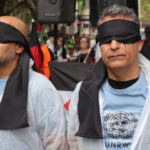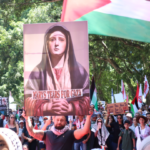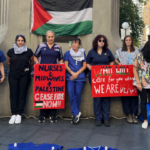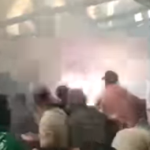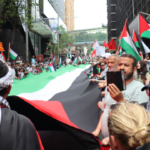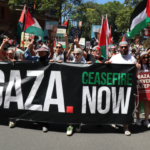Setting the Record Straight: The Jewish Council’s Sarah Schwartz on Antisemitism
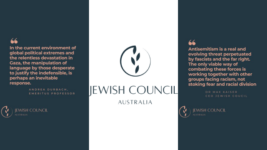
Currently, the mainstream media cycle is conveying that antisemitic incidents are on the rise in the community. However, whilst some of the examples are clearly about circumstances involving the expression of prejudice against Jewish people, others involve criticism of the Israeli state.
As most of the planet is aware, Israel is perpetrating a wholesale massacre in the Gaza Strip, which is breaching international law, as it carries out a multitude of the most serious atrocities, and criticism of this is being conflated in the public sphere as antisemitism.
Antisemitism is hostility and discrimination towards Jewish people because they are Jews. And the labelling of an individual as being antisemitic is damning, because it indicates that the person is revelling in the same hatred that led to the Holocaust in Europe during World War II.
The claims that actual antisemitic incidents being on the rise in this country are true, as is a clear escalation involving Islamophobia.
Yet, Israel has deliberately propagated the antisemitic conflation, so that its human rights violating actions can’t be criticised, and since October, the Australian public has become increasingly aware that this prohibition exists unofficially here, with the bipartisan approval of government.
Filling a void
This conflation of two behaviours – prejudice towards a people and criticism of a state – has been propagated by Australian Jewish bodies featured of late in the mainstream media discourse, which has seen the lines between the prejudice and the criticisms becoming increasingly blurred.
So, “in response to the pressing need for an independent expert body to address antisemitism and racism” the Jewish Council of Australia launched in early February. And the body is made up of a sizeable number of Jewish scholars, writers, historians and human rights lawyers.
“The Council was formed to fill a void in Australia of an independent expert Jewish body which can speak about antisemitism in Australia and which acknowledges the diversity of views within the Jewish community in regard to the state of Israel,” a 6 February press release reads.
Indeed, one of the key issues with the conflation of Jews and Israel is that not only is criticism of what the highest court on the planet ruled is a plausible genocide suppressed, but it also serves to make it increasingly difficult to clearly identify the true antisemitism and deal with it.
A global dictate
The rationale behind the establishment of the Israeli state is Zionism: the movement to establish a Jewish state in Palestine. Criticism of the Zionist project in the Middle East is akin to the type of negative appraisal of Israel that is being misconstrued as antisemitism.
And to provide an idea of how this conflation is being propagated at the highest level, the US congress lower house passed a resolution that served to establish that anti-Zionism, or the criticism of the Israeli state, is antisemitism.
Sydney Criminal Lawyers spoke to Jewish Council of Australia’s Sarah Schwartz about the chilling effect the antisemitism conflation is having in terms of criticising Israel and dealing with prejudice, as well as the prominent position that Jewish voices are playing in the movement to end the genocide.
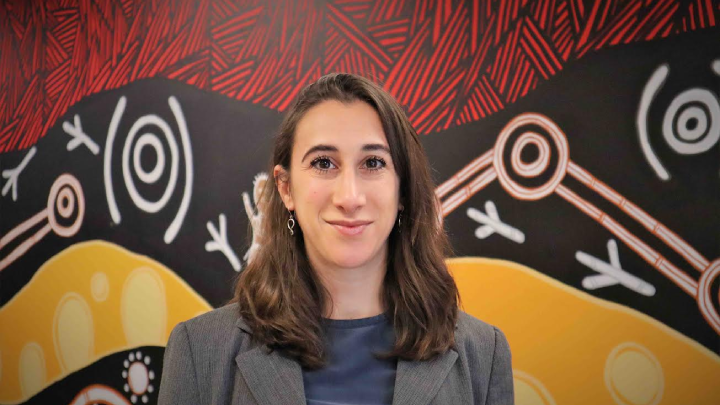
Jewish voices across the globe have been some of the strongest, alongside that of Palestinians, calling for a permanent end to the genocide that’s been taking place for five months in Gaza.
The slogan ‘Not in My Name’ has been adopted by those Jewish people mobilising for Palestinians, because Israel has a tendency of framing its actions as actions relating to all Jewish people.
Sarah, can you speak about what it’s been like to be a Jewish person living in Australia while the Israeli state is committing what the International Court of Justice has ruled a plausible genocide?
It is horrifying to see what Israel is doing in Gaza in the name of all Jewish people, which has been found to be a plausible case of genocide.
As we speak, Israel is preparing for an invasion of Rafah. Rafah’s pre-war population was about 300,000, but now it has about 1.4 million people, and Israel had declared that area a safe zone, while it bombarded areas in the north.
Now so many Palestinian people are trapped there, and we are seeing all these horrifying images coming out of Rafah and Gaza.
All the while, many Jewish organisations in Australia continue to celebrate Israel’s actions and to actively lobby for it.
For me, and many others in the Jewish Council and for many other Jewish people, that is a complete disjuncture with Jewish teaching, which teaches that every life is precious.
So, many Jewish people, in this moment, have felt compelled to use their voices to voice their opposition to what Israel is doing in our name.
And as you say, it is all over the world, including Australia. We have seen thousands of Jewish people rise up in this moment marching in antiwar rallies, signing ceasefire petitions and saying, “Not in our Name.”
You’re a spokesperson for the Jewish Council of Australia, which launched a few weeks ago in response to what’s happening in the Middle East, as well as a phenomenon that’s occurring locally where criticism of Israeli atrocities is being labelled antisemitic.
The council says it has formed to “fill the void in Australia of an independent expert Jewish body which can speak about antisemitism”.
Of late, there have been other Jewish organisations prominently featured in the public discourse, so why is there a void? What are you attempting to set straight?
In Australia, there are many Jewish organisations, however, many, if not most, have failed to recognise that Jewish people have diverse views on Israel’s military actions, and they represent the Jewish community as having a singular voice in support of Israel.
There is a real void of Jewish organisations that can speak to the diversity of Jewish opinions on Israel’s actions.
We are not claiming to be a representative organisation. We are a group of Jewish academics, historians, lawyers, writers and teachers.
We bring expertise on Jewish history, antisemitism, racism and human rights. And we are also proud Jewish people. So, that is the capacity in which we are speaking.
One of the things which led to the formation of the Council has been this conflation that the Israel Lobby makes of legitimate criticism of Israel and antisemitism, and the way that stifles voices of, not just Palestinians and their supporters, but those fighting against antisemitism.
Jewish organisations saying chants like “From the River to the Sea” are antisemitic, which is a call for freedom and equality, suggest that all Jewish people feel unsafe by those chants. We think that there is a real need to highlight that the Jewish community is not a monolith.
There are many Jews who are critical of Israel and its military actions. Also, many Jewish people don’t support a state that prioritises the rights of Jewish people over Palestinians.
So, we are that Jewish voice that speaks to racism and antisemitism, particularly on the far-right and neo-Nazis, and we can speak to the diversity of views held by Jews in regard to Israel’s actions.
As you’ve described it, what has been occurring in this country of late, is “legitimate expressions of support for Palestinians who are facing overwhelming levels of violence and displacement” are now being framed as antisemitic.
As a Jewish person concerned about antisemitism, what do you think about the concept being twisted to the point a charge akin to racism is being misconstrued?
Antisemitism is a form of racism against Jewish people, and it is about hatred and of Jewish people as Jews. But criticism of Israel must be distinguished from this.
Antisemitism, like all forms of racism, does matter and needs to be tackled. Reports of antisemitic incidents have spiked since the October 7 attack in Israel, and we know that so many Jewish people are feeling scared in this moment.
We know about antisemitism because so many people on the Council and our family members have experienced it over the course of their lives.
But it really doesn’t help these fears and it doesn’t help the fight against antisemitism to make false claims about it.
We think it is really important to make that distinction between the safety of Jewish people and criticism of Israel.
Rhetoric from domestic and world leaders seems to be reinforcing these fears rather than attempting to reduce social tensions. For example, President Biden has said that no Jew would be safe if it weren’t for Israel. That is really dangerous language.
Over the past few months, we’ve also seen almost every act that is critical of Israel, from calling for a ceasefire to highlighting Palestinian suffering, being framed as antisemitic.
No government is immune from criticism and accountability. These accusations are made cynically to shut down genuine criticism of Israel, and it is difficult to think of another context where we would say the criticism of a government, or a state is racist.
There is nothing antisemitic about calling for an end to Israel slaughtering children in Gaza. And there is nothing antisemitic about supporting freedom, equality and human rights for Palestinians.
The claims that these things are antisemitic are really damaging. They undermine the Palestinian freedom movement, and they dehumanise Palestinians in their struggle.
Laws are now being predicated upon the threat of antisemitism in the community. In NSW, hate speech laws were toughened seemingly in reaction to the Opera House incident.
This incident was found to have involved a small group making antisemitic comments, but the more serious statements claimed to have been made, which would have likely breached the criminal threshold, weren’t spoken.
The revealing of the names of Jewish people on a WhatsApp list has been cast as antisemitic and is leading to expedited federal doxxing and hate laws.
What do you think about antisemitism being used as a pretext to draft new laws?
In terms of the Opera House, as you say, there were antisemitic chants made by a small group, who were subsequently kicked out by the event organisers. However, the most egregious chant claimed to have been made, that of “gas the Jews”, was found to not have a proper evidentiary basis.
It is concerning the government swiftly reacted to an alleged chant without proper evidence. It shows the government isn’t making rational decisions about these issues.
In terms of the doxxing, it’s concerning to us that, from what has been published about the WhatsApp group, some people within it were engaged in those same sorts of actions of targeting individuals who were in support of Palestine that they’re now complaining about having their actions exposed.
We don’t agree with the targeting of individuals for harassment, but it is really telling that the government only chose to respond now.
We know that Palestinians have been the subject of personal attacks and have been fired from employment due to the Israel lobby for years. Only last week Sky News revealed personal details of Palestinians who have fled persecution in Gaza and come to Australia.
We don’t know exactly what the anti-doxxing laws will look like yet. But in response to your question, we can’t criminalise our way into social cohesion: addressing racism can’t be dealt with by way of kneejerk criminal justice responses.
We know that the criminal justice system disproportionately targets racial minorities, people experiencing other forms of disadvantage and simply criminalising action doesn’t work to address racism.
We need to start building bridges, looking at solidarity and understanding the root causes of racism.
It is concerning that in this time when Israel is planning a ground offensive in Gaza, where Palestinians are trapped with nowhere to go, that the focus of the Australian government is on this topic, rather than taking any action on this.
The Council launched on 6 February. At the time, it appeared a bold move considering the reception those countering the dominant paradigm are receiving in the media at present.
Indeed, it seems that journalists right now in Australia can get in more trouble for criticising Israel than they can over domestic matters.
How does the council consider it’s become so forbidden to criticise Israel?
Israel and its lobby have long used this strategy of labelling all criticism of Israel as antisemitic.
This is a strategy to distract and stifle legitimate scrutiny of Israel, and so it is unsurprising that they are using this strategy, when the Israeli military is using unprecedented levels of violence against Palestinians.
We have seen this globally. The Israeli government has tried to make it illegal to criticise its actions and has even arrested Israelis for posting critical content on social media. It is really important that the world recognise that this is a deliberate strategy to avoid accountability and justice over its actions.
We have seen in the US, the House of Representatives, also passed a motion declaring anti-Zionism to be a form of antisemitism.
We say that actions like this are not only extremely damaging to the Jewish community. But they give Israel broad cover to continue its campaign of killing and annexation in Gaza and the West Bank.
And lastly, Sarah, Australian politicians have been critical of the pro-Palestinian demonstrations, when they’re calling for an end to a genocide. This is in keeping with the framing of criticism of Israel in Gaza as antisemitism.
The Australia government and the mainstream media has told a biased story and that’s Israel’s version of events.
How does the Jewish Council of Australia consider the way the government has been handling the crisis in Gaza and the fallout from it?
Israel’s attack on Gaza, the number is now at least 30,000 people having been killed, including over 11,000 children, should be at the front of the public mind.
We need to focus on what is happening in Gaza and the responsibility the Australian government has in facilitating-enabling the conflict both through its arms, funding and diplomatic support for Israel. And really important to this is listening to Palestinian voices on the ground in Gaza and hearing what they’re saying and experiencing.
That’s why we need to avoid this behaviour we’ve been discussing, as it stifles legitimate conversation and criticism.
Personally, I grew up hearing stories of holocaust survivors, and hearing how the world stood by. We can’t let Australia stand by as one of its allies commits atrocities.
I’m concerned that the Australian government’s ongoing support for Israel, despite having expressed concerns, and its lack of material action, could potentially mean that it is in breach of its obligations under international law, given that the ICJ has found the plausible case of genocide.


